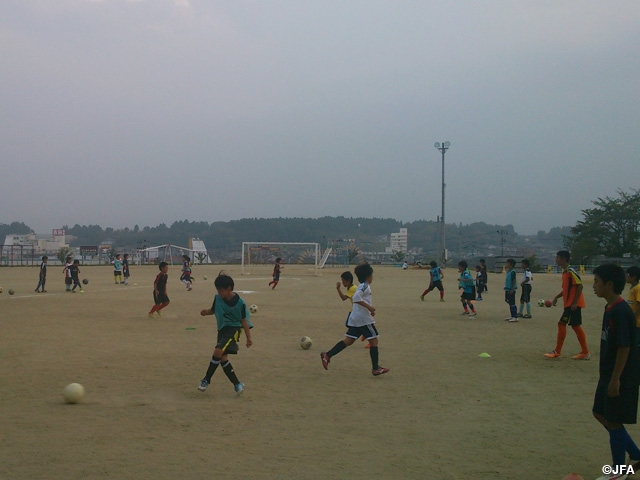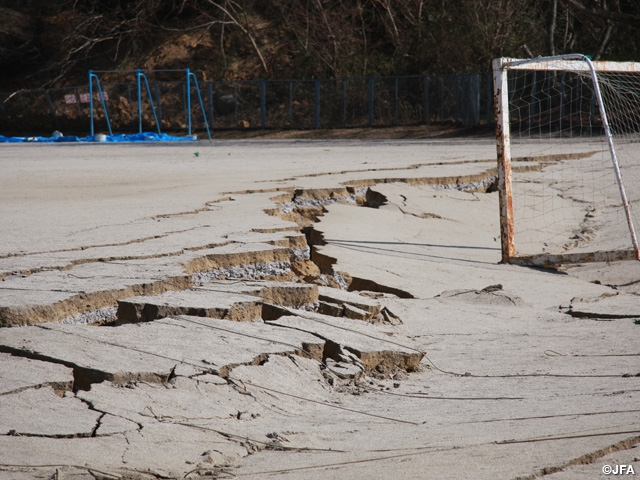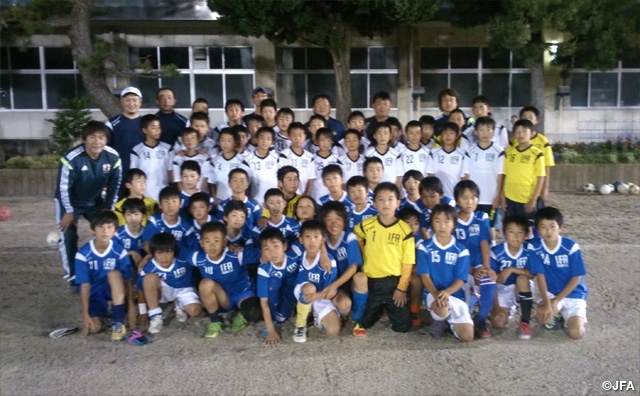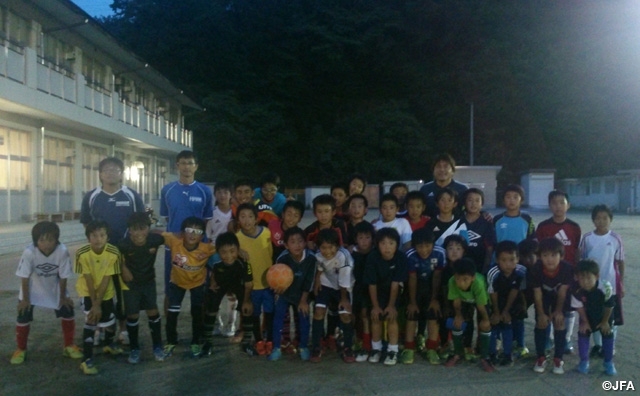NEWS
JFA Tohoku Reconstruction Support Project - June 2014 Report by TEGURAMORI Hiroshi, national training centre coach
03 July 2014

We have provided support for the National Training Centre in Fukushima as part of the JFA Reconstruction Support Project. Since 2013, we have also supported the U-12 Training Centre at six locations in five regions. The academy coaches, led by JFA Academy Fukushima’s Nuno Keiichiro as School Master, take a role in the training centre in Iwaki. Since 2014 coaches in charge of National Training Centre in Tohoku and I have joined the supporting efforts.
The latest training centre session was held at Kashima Elementary School and Chuodai Kita Junior High School in Iwaki on 17 June. I took care of U-11, Yamazaki Shigeo, Youth Director in Tohoku, was in charge of U-12 in Kashima Elementary School, and Kikuchi Toshizo from the National Training Centre in Tohoku coached U-13 at Chuodai Kita Junior High School Ground. For me, this was the first time to visit the training centre in Iwaki, but the training session seemed to run smoothly, thanks to all the staff putting a constant effort in this. Everyone who participated in the training kept their theme in mind, and then enjoyed it and worked hard.
I arrived in Iwaki on the day before the event day and visited a joint training session of Ueda Soccer Sports Shonendan (Ueda SSS) and Nakoso Fourwinds.
The training site was Ueda Elementary School, located on a small scenic hill. Although its field had lighting facility and was good enough to play football before the Tohoku Earthquake and Tsunami, it caved after the earthquake. The gym also collapsed and wasn’t available for use.
After a year and half, the ground was reconstructed and the gym became good for use again, but different colours of soil are now spread here and there on the ground. That clearly shows the disaster’s damages still remained.
The training started with playing tag followed by passing drills, ball control drills and then ball-possessing drills. Everyone concentrated on the session. Because coaches of both teams were from the training centre and had good coaching skills, kids picked things up quickly. We had a game among each generation at the end of the session. Kids played energetically with good atmosphere. I was impressed that coaches from different teams took care of the kids and organised such a joint training. That must have given a great motivation to their kids.

Iwaki City is located in the coastal region in Fukushima and was devastated by the Tohoku Earthquake and Tsunami. According to Coach Sakamoto Hideyuki from Ueda SSS, kids witnessed the scene that ground surface was collapsed. “Scared. We can’t play football anymore―That’s the moment kids broke off their heart”, said Coach Sakamoto with a pensive attitude.
They finally were able to start playing football when the school ground was reconstructed after the following year’s summer vacation. While the school ground was not available for a year and half, the team practiced at the Higashida Chuo Park in the neighbourhood. Of course there was no goal, and no lightings, but only a few street lights. Despite such inconvenience, kids were full of joy playing football.
“Now we can go to school and play football, but at that time our outdoor activities were limited and we were not allowed to practice without measuring radiation dose in and around the park and forced to stop our practice once raining started. That was a hard time. We are here now because no one stopped coming to the practice even at the first practice after the earthquake, and players, parents and coaches were all united to help each other more than they did before the earthquake” said coach Sakamoto.
Not until a month after the disaster, Takahagi Yojiro (Sanfrecce Hiroshima), the former player of Ueda SSS, came to cheer them at their practice site, Higashida Chuo Park. Coach Sakamoto looked back the delightful moment, saying “He (Takahagi) gave a big relief and hope to kids who started to look forward despite overwhelming anxiety.”
Coach Sakamoto also said, “It’s up to us either stop moving forward or keep moving forward. Watching kids who have bright futures, what we need to do for the kids as adults in football is to create an environment where they can play football as much as they want to. While we do that, I sincerely hope the reconstruction moves forward in order for kids to look ahead to their bright future, have hopes and keep living"
The training centre support in Iwaki seemed to be a good opportunity for players and coaches to have deeper understanding of football, and also for Class 2 and 3 coaches to take a look at Class 4 activities, which they don’t otherwise do very often. Coach Sakamoto expressed his refreshing emotion, saying “This became a trigger for the training centre in Iwaki as a whole to be more active for itself. We’d like to continue our friendship and motivate our kids through the training centre activities, and I hope we move forward for the reconstruction, too”


Related News
Latest News
-
National Teams
2024/04/23
【Match Report】U-23 Japan National Team lose to Korea Republic to advance to knockout stage as runners-up - AFC U23 Asian Cup Qatar 2024™

-
National Teams
2024/04/20
【Match Report】U-23 Japan National Team advance past group stage with two consecutive clean sheets - AFC U23 Asian Cup Qatar 2024™

-
National Teams
2024/04/17
【Match Report】U-23 Japan National Team win first group-stage match despite playing with 10 men following first-half sent-off - AFC U23 Asian Cup Qatar 2024™

-
National Teams
2024/04/12
U-17 Japan Women's National Team squad & schedule - AFC U17 Women's Asian Cup™ Indonesia 2024 (4/27~@Chiba, 4/29~@Thailand, 5/3~@Indonesia)

-
Referees
2024/04/05
YAMASHITA Yoshimi, TESHIROGI Naomi, and BOZONO Makoto named to officiate matches in the Games of the XXXIII Olympiad (Paris 2024)



